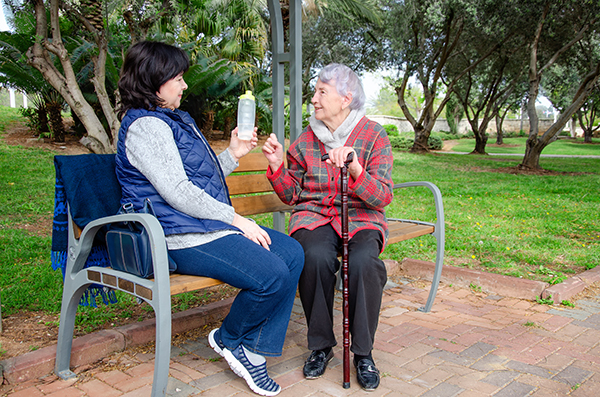While there are particular commonalities, Alzheimer’s disease affects each individual differently. Our highly trained dementia caregivers know, for example, that while one individual may take pleasure in being outside, someone else might be overloaded by so much sensory input and prefer a tranquil indoor environment. Someone may love a morning bath routine, while a measure of resourcefulness is necessary to help a different person manage good hygiene.
We also know that there are certain triggers that will often worsen the challenging elements of Alzheimer’s disease. Family care providers should be especially mindful to avoid the following:
- Dehydration. Individuals diagnosed with dementia may not be in a position to recognize when they are thirsty, or may refuse when provided fluids. It is important to ensure proper hydration to stop further confusion and weakness. Plain water is most beneficial, but if refused, try flavored waters. Another solution could be in using a variety of cups or bottles.
- Isolation. Those diagnosed with dementia suffer from loneliness as much as anyone else. Without having adequate social stimulation, they can become increasingly agitated or paranoid. An expert caregiver, like those at Independence-4-Seniors Home Care, who are thoroughly trained in dementia care, can provide suitable socialization, giving members of the family a much-needed break from care.
- Sugar. It’s common for those with Alzheimer’s disease to have an increased craving for cookies, cake, and other sugary snacks, but it may also produce greater irritability. Try offering a number of healthier choices, like fruit or yogurt, or sugar-free goodies.
- Sleeping pills. With the challenges of common sleep problems such as sundowning, it is often tempting for family members to offer sleeping pills to a loved one with Alzheimer’s to promote a more restful night. Yet these drugs raise the risk of falls and other accidents and add to fogginess and confusion. Discuss the issue with the individual’s physician and look for an all-natural, sleep-inducing option.
- TV. Be aware of what is on television; shows that contain crime, violence, and even the nightly news can instill worry and paranoia in those diagnosed with dementia. It may be a good idea to leave the TV off and engage your senior loved one in alternate activities, such as games, puzzles, reading together, exercising, and reminiscing – or select films you have thoroughly reviewed to ensure content is appropriate.
Each member of our dementia care team is fully trained and experienced in providing person-centered, compassionate care to effectively manage the difficulties inherent with Alzheimer’s, and to boost quality of life. Call us at (630) 323-4665 for further dementia care tips, and for an in-home consultation to discover how our specialized in-home Alzheimer’s care in DuPage County can make life brighter for your loved one.

